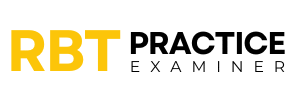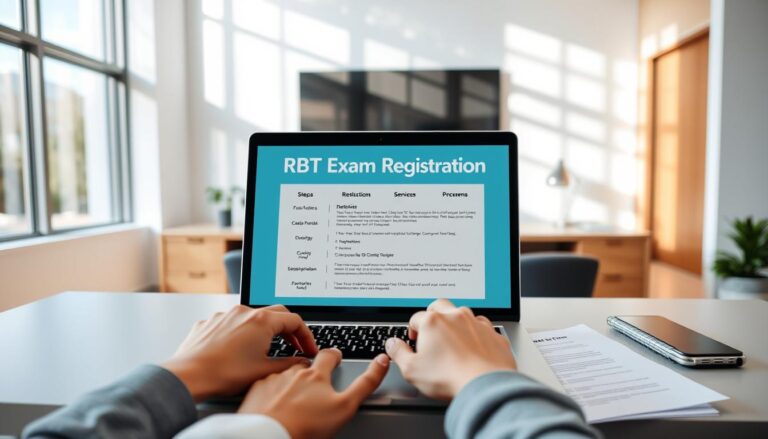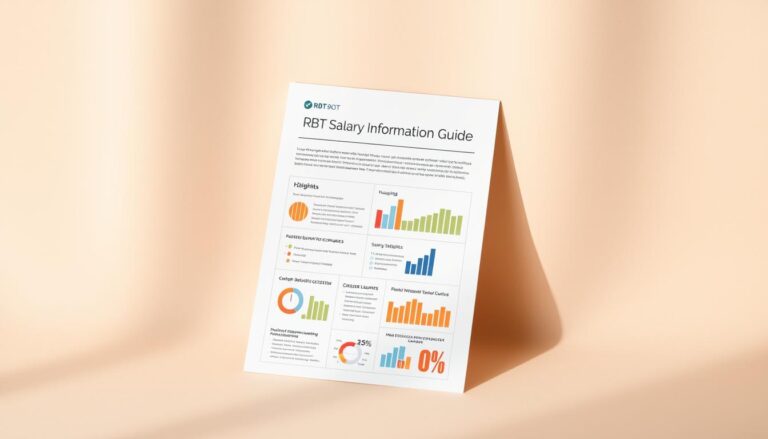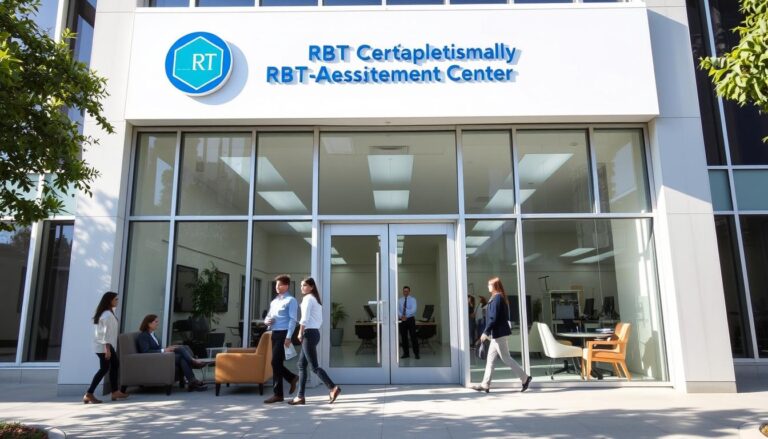Train Your Brain Like a Pro: Smart Hacks to Master the RBT Exam
Becoming a Registered Behavior Technician (RBT) is more than just knowing stuff. It’s about using smart brain training techniques to ace your exam. Preparing for the RBT exam means more than just memorizing facts. It’s about learning in a way that makes sense and getting your mind ready.
Those who pass the RBT exam know how to train their brain for it. They use special strategies to learn better. Our guide will show you how to use these techniques to improve your studying and feel more confident on the exam.
The path to becoming an RBT is tough, but with the right prep, you can do it. We’ll share new ways to get ready for the RBT exam. These methods will help you build mental strength and improve your test-taking skills.
This guide is for anyone looking to do well on the RBT exam. It offers tips to make your brain better at learning. Get ready to use your brain to its fullest and feel confident when you take the RBT exam.
Understanding the RBT Exam Structure and Requirements
Getting ready for the Registered Behavior Technician (RBT) exam needs a smart plan. You must focus on cognitive training and study tips. The exam’s complex layout can be tough, but with good prep, you can feel ready.
The RBT exam checks your knowledge and skills in applied behavior analysis. To do well, you need to know the main parts and areas that will be tested.
Core Components of the RBT Examination
The exam looks at key areas of a behavioral technician’s skills:
- Measuring behavior
- Assessment techniques
- Strategies for reducing behavior
- Ways to teach new skills
- Keeping records and reporting
Task List Breakdown and Assessment Areas
Pay attention to the detailed task list for the RBT test. It covers important cognitive training tips. The main areas to focus on are:
- Fundamental skills in behavior analysis
- Using behavior reduction procedures
- Using skill acquisition procedures
- Professional conduct and ethics
Testing Format and Time Management
Knowing the exam’s layout is key for good study tips. The test has multiple-choice questions that test your critical thinking and practical skills in behavioral analysis.
Here are some time management tips:
- Practice with timed mock exams
- Use a methodical way to answer questions
- Set time limits for each section
- Check your answers carefully
How to Train Your Brain for the RBT Test: Essential Strategies
Getting ready for the Registered Behavior Technician (RBT) exam needs smart mental prep. To ace the RBT test, you must sharpen certain brain skills. These skills are key to doing well in this tough test.
Start by knowing your brain’s strengths and weaknesses. To boost your RBT mental game, try these top strategies:
- Active recall techniques
- Spaced repetition learning
- Elaborative rehearsal methods
- Critical thinking skill development
Improving your brain for the RBT exam targets three main areas:
| Cognitive Skill | Training Approach | Expected Outcome |
|---|---|---|
| Memory Retention | Mnemonic devices | Improved information recall |
| Problem Solving | Case study analysis | Enhanced analytical thinking |
| Information Processing | Focused practice tests | Faster mental response |
Mental training is not just about memorizing, but really getting complex behavioral ideas. Try breaking down hard scenarios into simpler parts. This way, you’ll get better at analyzing, a skill you’ll need for the RBT test.
Regular mental exercises and specific learning methods can really up your game for the RBT test. Use these strategies to feel more confident and mentally strong.
Creating an Effective Study Schedule for RBT Success
Getting ready for the RBT exam needs a smart study plan. Making a study schedule that fits you is key. It helps you learn well and keep your life balanced.
Good study tips for the RBT test start with knowing how you learn best. Everyone learns differently. So, making your study plan unique is important for passing the exam.
Identifying Your Optimal Study Time
Think about when you study best for RBT exam success:
- Morning Sessions: Great for those who wake up early and feel sharp
- Evening Sessions: Best for those who learn better after a day of rest
- Everyone’s best study time is different
Balancing Study and Practice
Your study plan should mix learning and practice tests. A good mix might be:
- 60% focused study time
- 40% practice test scenarios
- Regular self-assessment
Setting Realistic Daily Goals
Make goals that are reachable but keep you motivated. Break your study materials into small parts. This way, you can track your progress easily.
Key strategies include:
- Setting specific daily learning targets
- Using a study tracker or journal
- Rewarding yourself for meeting goals
A well-planned study schedule is your guide to RBT exam success. Be flexible, listen to your body and mind, and change your plan if needed.
Brain Training Exercises Specific for RBT Candidates
To get ready for the Registered Behavior Technician (RBT) exam, you need special brain training. These exercises boost your thinking skills. They help you focus better and make fast decisions.
Here are some key brain training exercises for RBT test prep:
- Pattern Recognition Drills: Practice spotting behavioral patterns and sequences to sharpen your analytical skills
- Memory Mapping Techniques: Use visual mind maps to link complex behavioral ideas
- Rapid Decision Simulation: Improve your quick thinking with timed scenario-based exercises
Improving your cognitive abilities for the RBT test means doing specific mental workouts. These exercises target important skills like:
- Attention to detail
- Critical thinking
- Information processing speed
- Contextual understanding
Doing brain training every day can really up your game. Spend 15-20 minutes a day on these exercises. It will make you more confident for the RBT exam.
Use digital brain training apps, solve complex behavioral scenarios, and practice active recall. The aim is to make your study time count for cognitive skill growth.
Memory Enhancement Techniques for RBT Concepts
Getting ready for the Registered Behavior Technician (RBT) exam needs more than just studying. Learning how to improve your memory can really help you do well on the RBT exam.
Good memory strategies make hard information easier to understand. By using the right methods, RBT test-takers can learn and remember important behavioral analysis ideas better.
Mnemonic Devices for Technical Terms
Mnemonic devices are great for remembering tough words. Here are some creative ways to do it:
- Create acronyms that stand for key behavioral rules
- Make up memorable phrases that link technical terms
- Use pictures to help you remember abstract ideas
Visual Learning Strategies
Visual aids can really help you prepare for the RBT exam. Mind maps and diagrams make complex info easy to see and understand.
- Draw diagrams that show how behaviors are connected
- Use colors to sort different behavioral ideas
- Make flowcharts to show how interventions work
Active Recall Methods
Active recall is key to better memory. It means testing yourself on what you’ve learned. This strengthens your brain’s connections and helps you remember longer.
- Test yourself on important RBT ideas
- Try to explain complex topics without looking at notes
- Use flashcards to quickly check your knowledge
Using these brain training methods will change how you study for the RBT exam. It will make hard stuff easier to remember.
Mastering Multiple Choice Questions Through Mental Preparation

Getting ready for the RBT exam needs more than just memorizing. It’s about using smart strategies for multiple choice questions. With the right mindset, you can do much better.
It’s key to have a plan for tackling multiple choice questions. First, read each question carefully and understand it before looking at the answers.
- Eliminate obviously incorrect answers first
- Use the process of elimination strategically
- Look for key words that provide contextual clues
- Trust your initial knowledge before second-guessing
Mental preparation is more than just knowing the content. It’s about building a confident and methodical way to tackle tough questions.
Some top strategies for mental prep include:
- Practice active reading of each question
- Identify the specific skill being tested
- Use time management techniques during practice tests
- Develop a calm and focused mental state
When you face hard multiple choice questions, remember to think carefully and strategically. By using these techniques, you’ll boost your confidence and do well in the RBT exam.
Stress Management and Cognitive Performance During Exam Prep
Getting ready for the RBT exam can be tough, with stress affecting your mind. It’s key to use brain training to handle anxiety and keep your mind sharp. Learning how to boost your mental skills for RBT will make prep easier.
Stress can mess with learning and remembering things. It’s vital for RBT exam takers to focus on mental health to use their brain to the fullest.
Mindfulness Techniques for Test Anxiety
Mindfulness can really cut down test stress and boost your RBT skills. Here are some brain training tips:
- Practice daily meditation for 10-15 minutes
- Use deep breathing exercises before study sessions
- Develop a pre-study relaxation routine
- Utilize guided visualization techniques
Physical Exercise and Brain Function
Exercise is key for better brain function and stress control. It’s not just about mental exercises; physical activity matters too.
| Exercise Type | Cognitive Benefits | Recommended Duration |
|---|---|---|
| Aerobic Exercise | Improves memory and concentration | 30 minutes, 3-4 times weekly |
| Yoga | Reduces anxiety, enhances focus | 20-45 minutes daily |
| Strength Training | Boosts mental clarity and resilience | 2-3 sessions per week |
Remember, a holistic approach to exam preparation involves caring for both your mental and physical well-being. By using these stress management tips, RBT candidates can build strong cognitive skills and feel confident during the exam.
Digital Tools and Apps for Enhanced RBT Study Sessions

Getting ready for the RBT exam needs smart study tips. Digital tools have changed how we prepare for tests. They make learning fun and effective.
Choosing the right digital tools can really help your studies. Here are some top apps for RBT exam prep:
- Quizlet – Create interactive flashcards
- Anki – Advanced spaced repetition learning
- StudyBlue – Collaborative study platform
- Evernote – Note-taking and organization
When picking study apps, look for these features:
| Feature | Importance | Study Impact |
|---|---|---|
| Customization | High | Personalized learning experience |
| Offline Access | Medium | Study anywhere, anytime |
| Progress Tracking | High | Monitor learning improvements |
Digital tools are best when used with old-school study methods. Balance is key for good RBT exam prep.
Pro tip: Mix up your apps to keep things interesting. Try different ones to see what fits your learning style.
Critical Thinking Strategies for Complex RBT Scenarios
Getting good at critical thinking is key for doing well on the Registered Behavior Technician (RBT) exam. Learning how to train your brain for the RBT test means mastering certain problem-solving skills. These skills are more than just memorizing answers.
Those aiming to be RBTs need to learn to tackle tough behavioral analysis problems step by step. This way, they can turn confusing scenarios into clear, useful insights.
Problem-Solving Frameworks for Behavioral Analysis
For solving RBT problems, a clear plan is essential. Here are some important tips for cognitive training:
- Find the main behavioral issue
- Get all the context you can
- Look at possible ways to intervene
- Check the outcomes objectively
Case Study Analysis Methods
For complex case studies, RBT hopefuls should follow a detailed method:
- Read the whole scenario carefully
- Mark important behavioral notes
- Link theory to real-world use
- Create a comprehensive intervention plan
Preparing for the RBT test means sharpening your analytical skills. By practicing to break down complex problems, spot patterns, and come up with solutions based on evidence, you’ll see big improvements.
Building Mental Stamina for Long Study Sessions

Getting ready for the RBT exam needs top-notch mental toughness. Brain training is key to boosting brain power and keeping focus during long study times. It’s not just about studying more—it’s about studying better.
Here are some ways to boost brain power for the RBT exam:
- Use the Pomodoro Technique for better study breaks
- Make a study space that cuts down on distractions
- Try cognitive training to get mentally stronger
- Practice mindfulness to sharpen your focus
Mental stamina is like a muscle—the more you train it, the stronger it becomes. RBT candidates can get their mental game up with brain training exercises. These exercises make your mind more flexible and focused.
Here are some key ways to build mental stamina:
- Split study sessions into 25-minute chunks
- Do short, intense mental challenges
- Use active recall to remember things better
- Stay physically fit with regular exercise
Regularly practicing these brain training exercises will help RBT exam takers. They’ll get the mental toughness needed for long, tough study sessions. Remember, building mental stamina takes time, patience, and hard work.
Practice Test Strategies and Performance Analysis
Getting ready for the RBT exam is more than just studying. It’s about using smart practice and analyzing your performance well. Learning how to tackle practice tests can really help you pass the RBT exam.
Effective practice tests are key to getting ready for the exam. They show you what you know and what you need to work on.
Mock Exam Techniques
To do well on the RBT test, follow these mock exam tips:
- Make a quiet, distraction-free space to study
- Use timed tests to get better at managing time
- Follow the real exam’s format exactly
- Practice deep breathing to handle test anxiety
Error Pattern Recognition
Spotting and fixing your mistake patterns is vital for the RBT exam. Keep track of your errors to turn weaknesses into strengths.
- Go over each wrong answer carefully
- Sort mistakes by topic or skill
- Make study plans for specific knowledge gaps
- Try similar questions again to solidify your understanding
Pro Tip: See practice test errors as chances to learn, not as failures. Every mistake helps you get better and reach your RBT certification goals.
Last-Minute Brain Hacks for Exam Day Success
The hours before your RBT exam are key. Using smart brain training can boost your skills and confidence.
To get your mind ready, take a holistic approach. Start with relaxation strategies to calm your mind:
- Practice deep breathing exercises for 10 minutes
- Use positive visualization techniques
- Minimize last-minute intensive studying
What you eat affects your brain. Choose foods that help your mind stay sharp:
- Hydrate with water
- Eat a balanced meal with lean protein
- Avoid heavy or sugary foods
Good sleep is essential for remembering things. Try to sleep 7-8 hours before your exam. Make your room quiet and dark, and stay away from screens before bed.
Manage your anxiety with cognitive reframing. Change negative thoughts to positive ones. Think about how well you know applied behavior analysis.
With these brain hacks, you’ll be mentally prepared. This will help you do well on your RBT exam.
Conclusion
Getting ready for the RBT exam needs a smart plan to train your brain. It’s not just about memorizing facts. It’s about understanding applied behavior analysis well and improving your mental skills for this important job.
To prepare for the RBT test, use a mix of learning methods. You’ve learned how to boost your memory, handle stress, and think critically. The most important thing is to keep practicing, learn in a way that works for you, and stay positive while studying.
Remember, success in the RBT exam comes from hard work, smart learning, and believing in yourself. Every study session moves you closer to your goal in applied behavior analysis. Your dedication to growing professionally and helping patients will show in your success as an RBT.
Keep your focus, stay confident, and believe in your study plans. Becoming an RBT is tough but doable with the right mindset and approach. Your future in this fulfilling career is just ahead.







